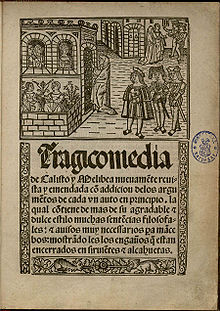La Celestina

Title page
|
|
| Author | Fernando de Rojas |
|---|---|
| Original title | Tragicomedia de Calisto y Melibea |
| Country | Spain |
| Language | Spanish |
| Genre | Medieval novel |
| Publisher | Burgos |
|
Publication date
|
1499 |
| Media type | Print (Hardback & Paperback) |
The Tragicomedy of Calisto and Melibea (Spanish: Tragicomedia de Calisto y Melibea), known in Spain as La Celestina is a work entirely in dialogue published in 1499. It is attributed to Fernando de Rojas, a descendant of converted Jews, who practiced law and, later in life, served as an alderman of Talavera de la Reina, an important commercial center near Toledo.
The book is considered to be one of the greatest works of all Spanish literature, and traditionally marks the end of medieval literature and the beginning of the literary renaissance in Spain. Although usually regarded as a novel, it is written as a continuous series of dialogues and can be taken as a play, having been staged as such and filmed.
The story tells of a bachelor, Calisto, who uses the old procuress Celestina to start an affair with Melibea, an unmarried girl kept in seclusion by her parents. Though the two use the rhetoric of courtly love, sex — not marriage — is their aim. When he dies in an accident, she commits suicide. The name Celestina has become synonymous with procuress, especially an older woman used to further an illicit affair, and is a literary archetype of this character, the masculine counterpart being Pandarus.
While chasing his falcon through the fields, a rich young bachelor named Calisto enters a garden where he meets Melibea, the daughter of the house, and is immediately taken with her. Unable to see her again privately, he broods until his servant Sempronio suggests using the old procuress Celestina. She is the owner of a brothel and in charge of her two young employees, Elicia and Areúsa.
When Calisto agrees, Sempronio plots with Celestina to make as much money out of his master as they can. She rewards him with Elicia. Another servant of Calisto's, Pármeno, mistrusts Celestina because he used to work for her when he was a child. Pármeno warns his master not to use her. However Celestina convinces Pármeno to join her and Sempronio in taking advantage of Calisto. His reward is Areúsa.
As a seller of feminine knick-knacks and quack medicines, Celestina is permitted entrance into the home of Alisa and Melibea by pretending to sell thread. Upon being left alone with Melibea, Celestina tells her of a man in pain who could be cured by the touch of her girdle. When she mentions Calisto’s name, Melibea becomes angry and tells her to go. But the crafty Celestina manages to get the girdle off her and to fix another meeting.
...
Wikipedia
